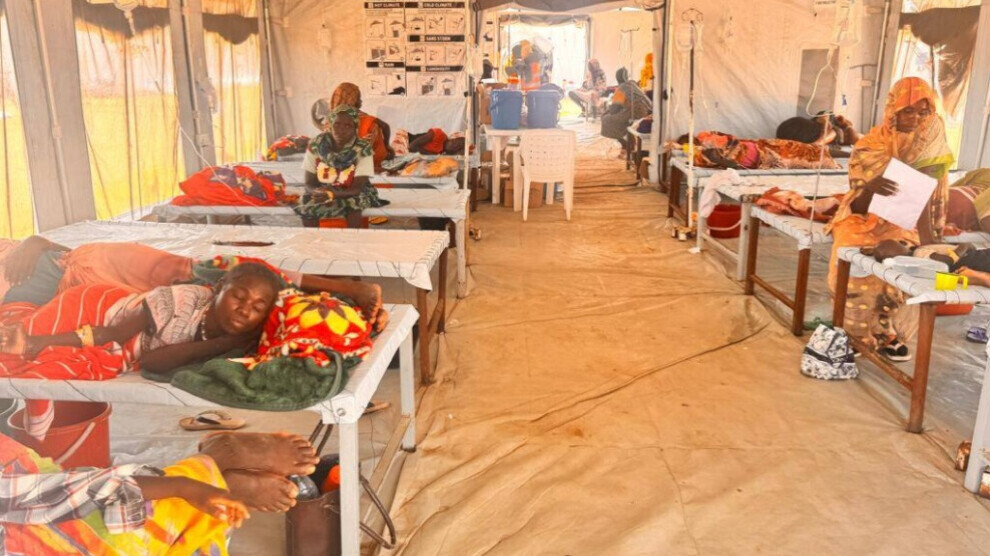Unprecedented health crisis in Darfur amid cholera outbreak
Sudan Doctors Network and the General Coordination for Internally Displaced Persons and Refugee Camps in Sudan (GCIRCS) warn of rapidly spreading cholera in Darfur amid near-collapse of healthcare system, with confirmed cases surpassing 5,000.

News Center - Sudan is grappling with a dangerous wave of cholera infections spreading across several states, amid a near-total collapse of the country’s health infrastructure. The crisis has been compounded by ongoing conflict and a sharp decline in vaccination rates, leaving millions—particularly children—at serious risk.
The Sudan Doctors Network and the General Coordination for Internally Displaced Persons and Refugee Camps in Sudan (GCIRCS) on Sunday, August 11, issued a warning about a rapidly accelerating cholera outbreak in the Darfur region, describing the health situation as an unprecedented catastrophe threatening millions.
According to the network, confirmed cholera cases have surpassed 6,000, with more than 103 deaths recorded in Tawila, North Darfur, alone, including children and women. It reported that the total number of disease and epidemic cases in the Tawila area has exceeded 2,500, with infections rising at an alarming rate—raising fears of a complete collapse of the region’s health and humanitarian systems.
The network said the catastrophic outbreak resulted from the systematic collapse of the healthcare system, caused by a siege imposed by the Rapid Support Forces (RSF) on the region. The blockade has halted supply chains, disrupted essential healthcare services, and created acute shortages of medicines.
It added that hundreds of doctors and medical staff have been killed, assaulted, or abducted, with many forced to pay large sums for their release. This has driven many to flee the region, further deepening the health crisis.
Causes of the worsening crisis
The network held the Rapid Support Forces fully responsible for the spread of the epidemic, saying that preventing official institutions and humanitarian organizations from carrying out urgent interventions, along with the growing number of displaced people from the Tawila area, were among the main factors exacerbating the crisis.
The General Coordination for IDP and Refugee Camps in Sudan (GCIRCS) said the cholera outbreak in Darfur is continuing, particularly in camps in Tawila, Jebel Marra, Nyala, and Zalingei, with a worrying rise in daily case numbers recorded in displacement centers.
It noted that most cases have been recorded in camps in the Tawila area, while others are concentrated in the villages of Martal, south of Tawila, and Tabra. The cumulative number of cases in the region has reached 3,761, including 71 deaths, with 137 patients currently in isolation, and 110 new cases reported in a single day.
Numerous cases have also been reported in other displacement camps, including 435 cases with 45 deaths in Kalma camp, 191 cases with 49 deaths in Otash camp, and 103 cases with four deaths in Dereig camp, in addition to cases in Al-Salam camp.
In the Zalingei area, the outbreak has reached the Hamidiya camp, with nine cases and one death reported, and the Khamsa Dagiga camp, with three cases and one death. In Talulwa, west of Zalingei, 30 cases and two deaths have been recorded, while two cases were reported in the agricultural area of Kombo Weir. In Orkom, south of Zalengi, four cases were confirmed. Since the outbreak began, the total number of confirmed cases has risen to 5,412, with 235 deaths.
The General Coordination for IDP and Refugee Camps (GCIRCS) continues to warn of the rapidly escalating and unprecedented spread of the disease in Darfur, which has now reached new areas. Despite severe shortages of medical supplies and limited isolation facilities, humanitarian actors — including organizations, volunteers, emergency rooms, and local authorities — are making strenuous efforts to combat the disease, defying difficult conditions and scarce resources.
